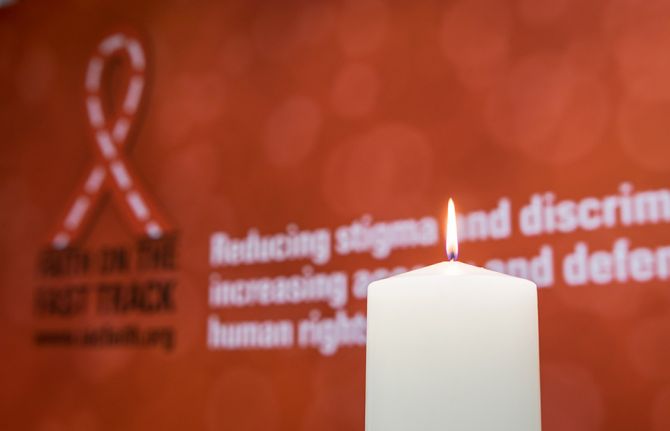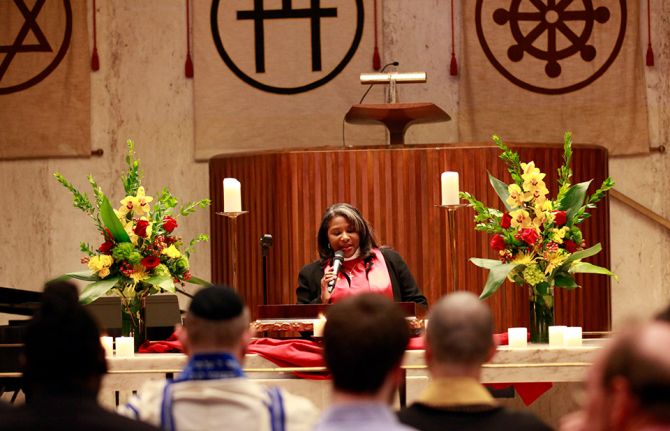



Feature Story
Strengthening the role of faith-based organizations in the HIV response
11 August 2020
11 August 2020 11 August 2020Since the beginning, faith-based organizations (FBOs) have played an important role in the response to the HIV epidemic through their strong links with communities on the ground and their broad network of hospitals, clinics and other health facilities.
However, to unleash the full potential of these organizations, there is still a need to reinforce their capacities to adopt new policies and innovations, to improve their collaboration and coordination with partners in the HIV response and to further address HIV-related stigma and discrimination within faith communities.
The 2015 Lancet Special Edition on faith and health care highlighted two challenges:
- a lack of solid evidence about the scale, scope, reach, quality and effectiveness of FBO health service provision;
- significant gaps between certain aspects of faith and rights-based approaches to health care.
To address these challenges, the United States President’s Emergency Plan for AIDS Relief (PEPFAR) and UNAIDS in 2016 launched a two-year initiative to strengthen the capacity of faith-based leaders and organizations to advocate for and deliver sustainable HIV responses.
The new initiative
The new PEPFAR-UNAIDS initiative, launched in June 2020, aims to leverage global and country leadership by FBOs in the HIV response. It will build on achievements, results and lessons learned, maximising the use of capacity-building tools and resources developed from previous programmes.
The initiative is designed as a consortium of longstanding FBO partners, working together to build and combine their strengths, promote evidence-based policy and practice and strengthen advocacy efforts.
“More than ever, it is important that faith communities and leaders are strong voices for people,” says Shannon Hader, UNAIDS Deputy Executive Director, Programme. “This means, in a time of COVID-19, recognizing that a call to action on COVID-19 and a call to action on HIV should be complementary and synergistic—they are not in opposition to each other. We will rely on faith partners to be strong and true voices of support for people living with HIV.”
Implementing partners and focus countries
All implementing partners have a solid track record of successfully implementing HIV-related activities; of partnership with UNAIDS and PEPFAR; and of working with inter-faith partners globally and at country level:
The implementing partners are:
- Academic Consortium led by St Paul’s University (Limuru, Kenya);
- African Christian Health Association Platform;
- Caritas Internationalis;
- Inter-Faith Network of Religious Leaders Living with or Personally Affected by HIV (INERELA+);
- Islamic Relief Worldwide;
- World Council of Churches – Ecumenical Advocacy Alliance;
- World Council of Churches – Ecumenical HIV and AIDS Initiatives and Advocacy.
Country-level activities will be carried out in Cameroon, Cote d’Ivoire, Democratic Republic of Congo, Kenya, Nigeria, the United Republic of Tanzania, Uganda and Zambia.
FBOs will align their activities to Faith Action Plans in support of national HIV response strategies. Experience shows that such an alignment results in a better coordinated and sustained participation of the faith sector in national responses to HIV.
“Our ability to partner with faith communities is part of a sustainable approach to address both HIV and COVID-19,” says Sandra Thurman, Chief Strategy Officer at PEPFAR.
Global level activities are aimed at increasing collaboration, visibility, and coordination of the contribution of faith-based organizations to the HIV response. Events will include an HIV Interfaith Conference on the theme of Resilience and Renewal (22-24 September 2020), implementation of the commitments made in the Rome Action Plan on Paediatric HIV, and the engagement of faith partners in the development of the new UNAIDS global strategy.



